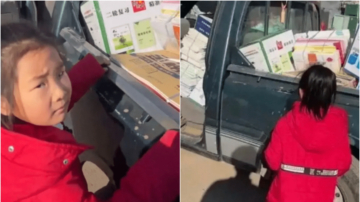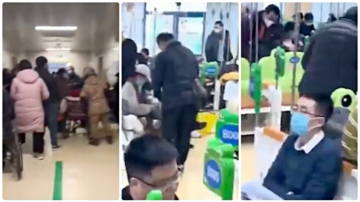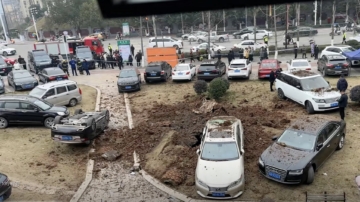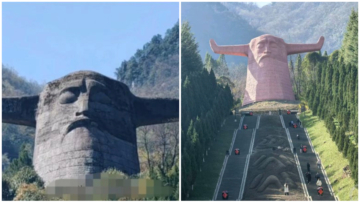【新唐人2015年02月04日訊】中共官方日前發佈2015年中央「一號文件」,再次聚焦「三農」問題,其中,保證人人有飯吃的糧食安全問題首當其衝。這個消息結合中共農業部不久前表示將啟動土豆主糧化的戰略,引發了民眾的關注。有分析指出,中國的糧食儲備出現了大問題。
2月1號,中共中央、國務院發佈有關「加快農業現代化建設若干意見」的「一號文件」,連續12年鎖定農業、農村、農民的「三農」問題,並提到中國農業面臨重大挑戰,如農業資源短缺、開發過度、污染加重等,再次將糧食安全列為首要任務。
不願透露姓名的農業研究人員:「咱們這個政府搞的這個文件在我看來就是一個噱頭,因為他們每年上,對農業真正促進了甚麼東西,沒有。根本性的問題沒解決,中國的農業不解決土地所有制問題,甚麼都是假的。因為你要經營農業,你必須要確保你的經營有持續性。真正的農業政策,核心就是土地私有。」
北京國情內參首席研究員鞏勝利表示,中共的一號文件已經出了20多年,尤其最近12年更是每年連續出,原因就是每一個文件都打了水漂,解決不了問題。
北京國情內參首席研究員鞏勝利:「一號文件就像中國傳統說的狗皮膏藥,每年都往上貼,偏又治不了問題。其實中國的三農,農民、農業、農村所說的三座大山,教育、醫藥、住房,一直都沒有辦法解決。有些不懂的人就說,看起來中共是在為農民年年做好事,其實是年年擦屁股,擦不乾淨。」
據了解,中共總書記習近平十八大後,曾多次強調糧食安全問題,他說,保障糧食安全是一個永恆的課題,一旦發生大饑荒,有錢也沒用。2013年12月召開的中央經濟工作會議,更是將「保障糧食安全」定位為經濟工作的第一大任務。
而中共農業部也在今年1月6號表示,將啟動土豆主糧化戰略,土豆將成為稻米、小麥、玉米之外的第四大主糧作物。
凡此種種,似乎說明了,中共當局正面對糧食儲備問題的壓力。
學者胡靖在接受大陸媒體《南方農村報》採訪時表示,根據對中央一號文件的解讀,他認為,中國的糧食安全出問題了,而且農業部今年還將土豆列入第四大主糧,這標誌著,中國的糧食儲備肯定出現問題了。只是中央不明說,將問題摀住。
胡靖表示,作為長期關注糧食安全的學者,他知道問題是出在華北地區的水資源上。他指出,小麥的主產區在華北地區,但該地區的地表水不是被嚴重污染,就是被工業用掉了,而地下水資源有限,已經打到幾百米深。土豆產量較高,而且抗旱,當局將它作為主糧,就是為了緩解糧食危機。
中共國家統計局去年12月4號曾發佈公告,指中國2014年糧食總產量60709.9萬噸,比2013年增加516萬噸,糧食總產量實現「十一連增」。不過,統計局的這一數字引發質疑。
不願透露姓名的農業研究人員:「產量都在虛報,統計數據有假,我們的農業實際上是在萎縮,現在大量的城市郊區的農田都被佔用了,所以農業的危機、糧食的危機,包括其他各方面的農業危機都來自於我們沒有有效的利用土地和合理的利用土地。」
國家級農業專家吳先生:「都跑到城裡頭打工去了,農村都沒有人勞動,沒有人幹活了。最近幾年主要靠進口,一個是美國和巴西的大豆,一個是美國的小麥和玉米。」
此外,針對人民幣對美元匯率持續下跌現狀,網絡撰稿人「心路獨舞」認為,人民幣下跌可能會觸發糧食危機。
據中國海關公布的數據,中國2013年的淨進口量已創下六年新高,成為美國食品出口最多的國家。「心路獨舞」指出,人民幣相對美元匯率的走軟,會推高進口糧食的價格,如何讓14億中國人不餓肚子,將是一個嚴峻的挑戰。
採訪/易如 編輯/陳潔 後製/舒燦
No. 1 Central Document Hints at Crisis of Food Supply.
The 2015 version "No.1 Central Document (the Document)"
once again focused on "three rural issues".
Overall it highlighted food security.
The Document ogether with the previously proposed potato
staple food strategy by the Ministry of Agriculture, critics
believe there is a huge problem with China’s grain reserves.
The Feb. 1, document sees the 12th consecutive year focused
on the "three rural issues", agriculture, rural areas and farmers.
It also highlights the challenges facing China's agricultural
sector.
These include a shortage of agricultural resources,
excessive exploitation and worsening pollution.
Food security was once again a top priority
in the governmental policies.
Agricultural researcher (anonymous), "This document is
simply a gimmick in my opinion. It is issued every year.
But has it provided any concrete help? No. The fundamental
issue remains unresolved.
Without dealing with the land ownership, everything is false.
The management of agriculture takes sustainability.
The core of agricultural policies is the
private ownership of land."
Beijing political magazine lead researcher Gong Shengli
indicates that the Chinese Communist Party (CCP) has
issued the Document for more than 20 years, in particular,
for the past decade, it has been issued on a yearly basis.
But it was only because none of it
has actually solved any problems.
Gong Shengli, "The Document is like a sticking plaster.
It was issued every year but solved nothing.
In fact, education, medicine and housing are the three big
mountains blocking the three rural issues of China, farmers,
agriculture and rural areas. Many Chinese have been deceived.
They thought the CCP is doing good deeds for farmers
every year.
But in fact, the CCP is failing in clearing
up the mess every year."
The Communist leader Xi Jinping reportedly stressed
the issue of food reserves.
He said that to secure food is an eternal subject.
In the event of famine, money is useless.
In a Central Economic Work Conference in December, 2013,
"food security" was prioritized as the first major task
of economic work.
On Jan. 6, the Ministry of Agriculture announced potatoes
will be an increasingly important staple food along with
rice, wheat and corn.
In all, it seems to suggest the CCP regime is faced
with the pressure of food reserves.
In a media interview, scholar Hu Jing interpreted the
Document as a sign that food reserves in China have problems.
With the Agricultural Ministry’s promoting of potatos as
the fourth staple food, he is certain food reserves are at risk.
The Central is trying to cover up the problem.
Hu Jing said that, as a scholar specializing in food security, he
knows that the water resources in north China are the problem.
He explained, northern China produces wheat, but the surface
water in the area is either heavily polluted or used by industry.
There is very limited groundwater, and the well has gone
as deep as several hundred meters down.
Potatoes have higher yield and better drought resistance, the
regime pushes it as a food staple to alleviate the food crisis.
The Communist National Bureau of Statistics showed that
China's total grain output was 607.099 million tons in 2014.
This is an increase of 5.16 million tons from 2013.
That marked 11 consecutive years of growth.
But, there is doubt about the data.
Agricultural researcher (anonymous): "The amount was false,
the data was false. Our agriculture is actually declining.
Massive suburban farmlands have been occupied
for other purposes.
The crisis of agriculture, food and other aspects has all come
from the ineffective and irrational use of the farmland."
National agricultural expert Mr. Wu, "People have all gone
to the cities. The rural area lacks manpower.
We have relied on imports for years: soybeans from the
United States and Brazil, and wheat and corn from the U.S.."
The RMB against the US dollar has continued to fall.
Blog writer "Xinlu Duwu" believed that the status quo
could trigger a food crisis.
She said that, according to data released by China Customs,
China has hit a new six-year high in net imports in 2013.
It has become the largest U.S. food-exporting country.
The weakened RMB exchange rate against the dollar will
push up the price of imported food.
To fill the stomachs of 1.4 billion Chinese people
will be a tough challenge.
Interview/YiRu Edit/ChenJie Post-Production/ShuCan
2月1號,中共中央、國務院發佈有關「加快農業現代化建設若干意見」的「一號文件」,連續12年鎖定農業、農村、農民的「三農」問題,並提到中國農業面臨重大挑戰,如農業資源短缺、開發過度、污染加重等,再次將糧食安全列為首要任務。
不願透露姓名的農業研究人員:「咱們這個政府搞的這個文件在我看來就是一個噱頭,因為他們每年上,對農業真正促進了甚麼東西,沒有。根本性的問題沒解決,中國的農業不解決土地所有制問題,甚麼都是假的。因為你要經營農業,你必須要確保你的經營有持續性。真正的農業政策,核心就是土地私有。」
北京國情內參首席研究員鞏勝利表示,中共的一號文件已經出了20多年,尤其最近12年更是每年連續出,原因就是每一個文件都打了水漂,解決不了問題。
北京國情內參首席研究員鞏勝利:「一號文件就像中國傳統說的狗皮膏藥,每年都往上貼,偏又治不了問題。其實中國的三農,農民、農業、農村所說的三座大山,教育、醫藥、住房,一直都沒有辦法解決。有些不懂的人就說,看起來中共是在為農民年年做好事,其實是年年擦屁股,擦不乾淨。」
據了解,中共總書記習近平十八大後,曾多次強調糧食安全問題,他說,保障糧食安全是一個永恆的課題,一旦發生大饑荒,有錢也沒用。2013年12月召開的中央經濟工作會議,更是將「保障糧食安全」定位為經濟工作的第一大任務。
而中共農業部也在今年1月6號表示,將啟動土豆主糧化戰略,土豆將成為稻米、小麥、玉米之外的第四大主糧作物。
凡此種種,似乎說明了,中共當局正面對糧食儲備問題的壓力。
學者胡靖在接受大陸媒體《南方農村報》採訪時表示,根據對中央一號文件的解讀,他認為,中國的糧食安全出問題了,而且農業部今年還將土豆列入第四大主糧,這標誌著,中國的糧食儲備肯定出現問題了。只是中央不明說,將問題摀住。
胡靖表示,作為長期關注糧食安全的學者,他知道問題是出在華北地區的水資源上。他指出,小麥的主產區在華北地區,但該地區的地表水不是被嚴重污染,就是被工業用掉了,而地下水資源有限,已經打到幾百米深。土豆產量較高,而且抗旱,當局將它作為主糧,就是為了緩解糧食危機。
中共國家統計局去年12月4號曾發佈公告,指中國2014年糧食總產量60709.9萬噸,比2013年增加516萬噸,糧食總產量實現「十一連增」。不過,統計局的這一數字引發質疑。
不願透露姓名的農業研究人員:「產量都在虛報,統計數據有假,我們的農業實際上是在萎縮,現在大量的城市郊區的農田都被佔用了,所以農業的危機、糧食的危機,包括其他各方面的農業危機都來自於我們沒有有效的利用土地和合理的利用土地。」
國家級農業專家吳先生:「都跑到城裡頭打工去了,農村都沒有人勞動,沒有人幹活了。最近幾年主要靠進口,一個是美國和巴西的大豆,一個是美國的小麥和玉米。」
此外,針對人民幣對美元匯率持續下跌現狀,網絡撰稿人「心路獨舞」認為,人民幣下跌可能會觸發糧食危機。
據中國海關公布的數據,中國2013年的淨進口量已創下六年新高,成為美國食品出口最多的國家。「心路獨舞」指出,人民幣相對美元匯率的走軟,會推高進口糧食的價格,如何讓14億中國人不餓肚子,將是一個嚴峻的挑戰。
採訪/易如 編輯/陳潔 後製/舒燦
No. 1 Central Document Hints at Crisis of Food Supply.
The 2015 version "No.1 Central Document (the Document)"
once again focused on "three rural issues".
Overall it highlighted food security.
The Document ogether with the previously proposed potato
staple food strategy by the Ministry of Agriculture, critics
believe there is a huge problem with China’s grain reserves.
The Feb. 1, document sees the 12th consecutive year focused
on the "three rural issues", agriculture, rural areas and farmers.
It also highlights the challenges facing China's agricultural
sector.
These include a shortage of agricultural resources,
excessive exploitation and worsening pollution.
Food security was once again a top priority
in the governmental policies.
Agricultural researcher (anonymous), "This document is
simply a gimmick in my opinion. It is issued every year.
But has it provided any concrete help? No. The fundamental
issue remains unresolved.
Without dealing with the land ownership, everything is false.
The management of agriculture takes sustainability.
The core of agricultural policies is the
private ownership of land."
Beijing political magazine lead researcher Gong Shengli
indicates that the Chinese Communist Party (CCP) has
issued the Document for more than 20 years, in particular,
for the past decade, it has been issued on a yearly basis.
But it was only because none of it
has actually solved any problems.
Gong Shengli, "The Document is like a sticking plaster.
It was issued every year but solved nothing.
In fact, education, medicine and housing are the three big
mountains blocking the three rural issues of China, farmers,
agriculture and rural areas. Many Chinese have been deceived.
They thought the CCP is doing good deeds for farmers
every year.
But in fact, the CCP is failing in clearing
up the mess every year."
The Communist leader Xi Jinping reportedly stressed
the issue of food reserves.
He said that to secure food is an eternal subject.
In the event of famine, money is useless.
In a Central Economic Work Conference in December, 2013,
"food security" was prioritized as the first major task
of economic work.
On Jan. 6, the Ministry of Agriculture announced potatoes
will be an increasingly important staple food along with
rice, wheat and corn.
In all, it seems to suggest the CCP regime is faced
with the pressure of food reserves.
In a media interview, scholar Hu Jing interpreted the
Document as a sign that food reserves in China have problems.
With the Agricultural Ministry’s promoting of potatos as
the fourth staple food, he is certain food reserves are at risk.
The Central is trying to cover up the problem.
Hu Jing said that, as a scholar specializing in food security, he
knows that the water resources in north China are the problem.
He explained, northern China produces wheat, but the surface
water in the area is either heavily polluted or used by industry.
There is very limited groundwater, and the well has gone
as deep as several hundred meters down.
Potatoes have higher yield and better drought resistance, the
regime pushes it as a food staple to alleviate the food crisis.
The Communist National Bureau of Statistics showed that
China's total grain output was 607.099 million tons in 2014.
This is an increase of 5.16 million tons from 2013.
That marked 11 consecutive years of growth.
But, there is doubt about the data.
Agricultural researcher (anonymous): "The amount was false,
the data was false. Our agriculture is actually declining.
Massive suburban farmlands have been occupied
for other purposes.
The crisis of agriculture, food and other aspects has all come
from the ineffective and irrational use of the farmland."
National agricultural expert Mr. Wu, "People have all gone
to the cities. The rural area lacks manpower.
We have relied on imports for years: soybeans from the
United States and Brazil, and wheat and corn from the U.S.."
The RMB against the US dollar has continued to fall.
Blog writer "Xinlu Duwu" believed that the status quo
could trigger a food crisis.
She said that, according to data released by China Customs,
China has hit a new six-year high in net imports in 2013.
It has become the largest U.S. food-exporting country.
The weakened RMB exchange rate against the dollar will
push up the price of imported food.
To fill the stomachs of 1.4 billion Chinese people
will be a tough challenge.
Interview/YiRu Edit/ChenJie Post-Production/ShuCan








